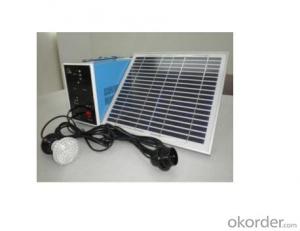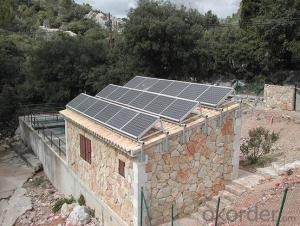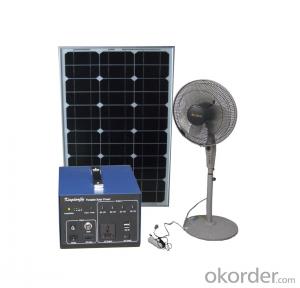CNBM Solar Home System Roof System Capacity-15W
- Loading Port:
- Shanghai
- Payment Terms:
- TT or LC
- Min Order Qty:
- 5 unit
- Supply Capability:
- 30000 unit/month
OKorder Service Pledge
OKorder Financial Service
You Might Also Like
Introduction of Solar Home System
Solar Home System is quite suitable product in urban area and the place which is short of electricity. Our Small Solar Home System own great benifits compare with other kind electricity resources:
Electricity generating cost of Solar Home System is much cheaper than diesel engine. Beside low electricity making cost, solar system products also have the features of noiseless, clean energy, environmentally friendly and can access to many different electric appliance.
Working Principle of Solar Home System
The stand alone Solar Home System is an off-grid solar system which uses batteries to store the solar energy. Stand alone solar system solutions design for those who are not able or willing to connect to electricity grid.
However, our on-grid solar home system can be connected to the grid for utilization of grid electricity power. Our solar system can add relative equipment as our customer’s requirement which have the function of switching to city electricity automatically. The solar system can use battery power in priority, if sunshine is not so good or loads consumption is too high which cause battery power insufficient. Then system can switch automatically to grid power supply. Meanwhile, the system can charge the batteries with grid power until batteries are fully charged. Then the solar system will switch back to battery power supply.
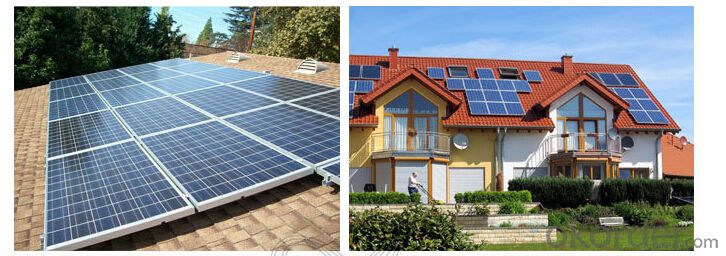


Specification of Solar Home System
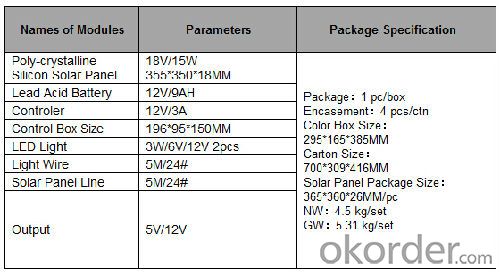
Advantage of Our Solar Home System
1 Excellent Performance: Our Solar Home System is composed by Brand Standard Kits with high quality. Our solar system has the advantage of high efficiency and stable operation. We can ensure our product with a long life period.
2. Small Orders Accepted: We can accept small orders as our customer’s trial order.
3. Warehouse: We have warehouse overseas which can bring great convenience to our customer to pick up the products.
FAQ
Q: Could you introduce the background of your company?
A: We are a Group corp. with 1GW capacity in China, which is Okorder’s registered VIP Supplier, possess Financial Service from Okorder.com.
Q: Required mainly certificates (CE&IEC/TUV/RoHS)?
A: Our products are certificated by CE RoHS, IEC, ISO, TUV, UL etc.
Q: Your main exported market is?
A: Main markets of our products is: South-east Asia, Mid-east, Arica, East Europe and Latin America.
- Q:Can solar energy systems be used in areas with high levels of dust or sand?
- Yes, solar energy systems can still be used in areas with high levels of dust or sand. However, the efficiency of the solar panels may be affected. Dust or sand can accumulate on the surface of the panels, reducing the amount of sunlight that can reach the photovoltaic cells. This can lead to a decrease in the energy production of the system. To mitigate this issue, regular cleaning and maintenance of the solar panels is required in dusty or sandy areas. This can be done by washing the panels with water or using automated cleaning systems. Additionally, tilt angles of the panels can be adjusted to minimize the accumulation of dust or sand. Furthermore, advancements in solar panel technology have led to the development of self-cleaning panels that can repel dust or sand particles. These panels use hydrophobic coatings or anti-soiling technologies to prevent dust buildup and maintain optimal energy production. In conclusion, while solar energy systems can be used in areas with high levels of dust or sand, it is important to implement proper maintenance and cleaning practices to ensure maximum efficiency and energy production.
- Q:Can solar energy systems be used for powering off-grid communities?
- Yes, solar energy systems can be used effectively for powering off-grid communities. Solar panels can generate electricity by converting sunlight into usable energy, making it an ideal solution for areas that lack access to traditional power grids. By installing solar panels and utilizing battery storage systems, off-grid communities can meet their energy needs sustainably and independently. Solar energy is a clean and renewable source, providing a reliable and cost-effective solution for powering off-grid communities.
- Q:Can solar energy systems be used in conjunction with other renewable energy sources?
- Yes, solar energy systems can be used in conjunction with other renewable energy sources. This combination, known as hybrid renewable energy systems, allows for a more reliable and efficient energy generation. By integrating solar energy with sources like wind or hydro power, the system can compensate for fluctuations in energy production, ensuring a consistent supply of clean and renewable energy.
- Q:Can solar energy systems be used in powering data centers?
- Yes, solar energy systems can be used to power data centers. In fact, many data centers around the world are adopting solar energy as a sustainable and renewable source of power. The abundance of sunlight in many regions makes solar energy an attractive option for powering energy-intensive facilities like data centers. Solar energy systems consist of solar panels that convert sunlight into electricity. These panels can be installed on the rooftops or surrounding areas of data centers to generate clean and green energy. The electricity produced can be used to power various operations within the data center, including servers, cooling systems, and lighting. One major advantage of using solar energy in data centers is the potential for cost savings. By generating their own electricity, data centers can reduce their reliance on the grid and lower their energy bills. Additionally, some regions offer incentives and tax benefits for investing in renewable energy sources, further reducing the financial burden. Moreover, solar energy systems can contribute to the overall sustainability of data centers. By utilizing a renewable energy source, data centers can significantly reduce their carbon footprint and environmental impact. This aligns with the growing global focus on reducing greenhouse gas emissions and combating climate change. However, it is important to consider the scalability and reliability of solar energy systems when powering data centers. Data centers consume large amounts of power and require a consistent and uninterrupted energy supply. To address this, data centers can incorporate energy storage solutions, such as batteries, to store excess energy generated during the day and use it during periods of low sunlight or high demand. In conclusion, solar energy systems can indeed be used to power data centers. They offer a sustainable and cost-effective alternative to traditional energy sources, while also contributing to environmental conservation. As the demand for data centers continues to grow, the integration of solar energy can play a significant role in creating a more sustainable and resilient digital infrastructure.
- Q:Can solar energy systems be used in off-grid locations?
- Yes, solar energy systems can be used in off-grid locations. In fact, they are an excellent solution for providing electricity in remote areas where access to the power grid is limited or non-existent. Off-grid solar energy systems can generate electricity through photovoltaic panels and store it in batteries for use during times when the sun is not shining. This enables individuals and communities in off-grid locations to have a reliable and sustainable source of energy.
- Q:Can solar panels be installed on different types of roofs?
- Yes, solar panels can be installed on different types of roofs, including flat, sloped, metal, shingle, tile, and even slate roofs. The installation process may vary slightly depending on the roof type, but solar panels can generally be adapted to fit and generate renewable energy regardless of the roof material or design.
- Q:Can solar energy systems be used in powering concert halls or auditoriums?
- Yes, solar energy systems can be used to power concert halls or auditoriums. These systems can be installed on the rooftop or nearby areas to harness sunlight and generate electricity. The generated solar power can then be used to run the lighting, sound systems, and other electrical equipment required for concerts or performances. Additionally, solar energy systems can be integrated with battery storage solutions to ensure a continuous power supply, even during periods of low sunlight or at night.
- Q:What is the impact of electromagnetic interference on solar energy system performance?
- Electromagnetic interference can have a negative impact on the performance of solar energy systems. It can cause disruptions and fluctuations in the electrical signals and data transmission within the system, leading to reduced efficiency and reliability. Additionally, electromagnetic interference can interfere with the proper functioning of inverters and other critical components, potentially causing system failures and downtime. Therefore, it is crucial to implement proper shielding and mitigation measures to minimize the impact of electromagnetic interference on solar energy system performance.
- Q:What is the role of energy management systems in a solar energy system?
- Energy management systems play a crucial role in a solar energy system by efficiently managing and optimizing the generation, storage, and consumption of solar energy. These systems are responsible for monitoring and controlling various components of the solar energy system, ensuring that the energy produced by the solar panels is utilized effectively. One of the primary functions of an energy management system is to regulate the flow of electricity between the solar panels, the energy storage system (such as batteries), and the connected loads. This is done by constantly monitoring the energy production and consumption levels, and making adjustments to ensure that the system operates at its maximum efficiency. Energy management systems also provide real-time data and analytics regarding the performance of the solar energy system. This information includes details about the energy generation, consumption patterns, and the overall system efficiency. By analyzing this data, users can identify areas for improvement and make necessary adjustments to optimize the system's performance. In addition, energy management systems enable remote monitoring and control of the solar energy system. This allows users to access and manage the system from anywhere, making it convenient to monitor energy production, consumption, and storage levels. It also enables users to remotely control and manage the system, such as adjusting settings or turning off certain loads during peak energy consumption periods. Furthermore, energy management systems play a crucial role in maximizing the utilization of solar energy by prioritizing the use of self-generated energy. These systems can be programmed to automatically direct excess energy produced by the solar panels towards charging the energy storage system, rather than exporting it to the grid. This feature ensures that the energy generated by the solar panels is stored and utilized efficiently, reducing dependency on the grid and maximizing the benefits of solar energy. Overall, energy management systems are essential components of a solar energy system as they provide efficient monitoring, control, and optimization of energy generation, storage, and consumption. By effectively managing the flow of electricity and providing real-time data, these systems enhance the overall performance and efficiency of the solar energy system, while also allowing for remote monitoring and control.
- Q:Do solar energy systems require maintenance?
- Yes, solar energy systems do require maintenance. Regular maintenance, such as cleaning the panels, checking for any damage or malfunctions, and ensuring proper functioning of the system, is necessary to maintain the efficiency and longevity of the solar energy system. Additionally, periodic inspections by professionals can help identify and address any potential issues before they become major problems.
1. Manufacturer Overview |
|
|---|---|
| Location | |
| Year Established | |
| Annual Output Value | |
| Main Markets | |
| Company Certifications | |
2. Manufacturer Certificates |
|
|---|---|
| a) Certification Name | |
| Range | |
| Reference | |
| Validity Period | |
3. Manufacturer Capability |
|
|---|---|
| a)Trade Capacity | |
| Nearest Port | |
| Export Percentage | |
| No.of Employees in Trade Department | |
| Language Spoken: | |
| b)Factory Information | |
| Factory Size: | |
| No. of Production Lines | |
| Contract Manufacturing | |
| Product Price Range | |
Send your message to us
CNBM Solar Home System Roof System Capacity-15W
- Loading Port:
- Shanghai
- Payment Terms:
- TT or LC
- Min Order Qty:
- 5 unit
- Supply Capability:
- 30000 unit/month
OKorder Service Pledge
OKorder Financial Service
Similar products
New products
Hot products
Hot Searches
Related keywords
